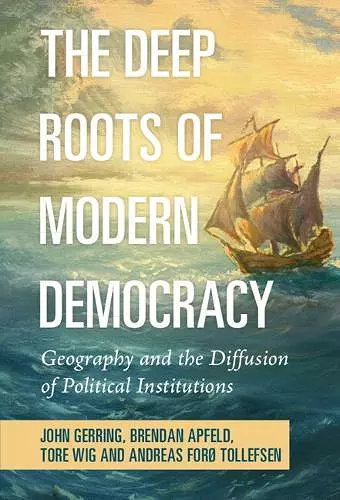The Deep Roots of Modern Democracy
Geography and the Diffusion of Political Institutions
John Gerring author Brendan Apfeld author Tore Wig author Andreas Forø Tollefsen author
Format:Hardback
Publisher:Cambridge University Press
Published:25th Aug '22
Currently unavailable, and unfortunately no date known when it will be back
This hardback is available in another edition too:
- Paperback£31.00(9781009114899)

This book explores the deep roots of modern democracy, focusing on geography and long-term patterns of global diffusion, through statistical analyses of new databases, small-N studies and a review of the historical literature. It will appeal to historically-oriented social scientists, political historians, and anyone interested in democracy.This book explores the deep roots of modern democracy, focusing on geography and long-term patterns of global diffusion. Its geographic argument centers on access to the sea, afforded by natural harbors which enhance the mobility of people, goods, capital, and ideas. The extraordinary connectivity of harbor regions thereby affected economic development, the structure of the military, statebuilding, and openness to the world – and, through these pathways, the development of representative democracy. The authors' second argument focuses on the global diffusion of representative democracy. Beginning around 1500, Europeans started to populate distant places abroad. Where Europeans were numerous they established some form of representative democracy, often with restrictions limiting suffrage to those of European heritage. Where they were in the minority, Europeans were more reticent about popular rule and often actively resisted democratization. Where Europeans were entirely absent, the concept of representative democracy was unfamiliar and its practice undeveloped.
'This book replaces the stereotyped generalizations in comparative politics with something genuinely novel, comparative and historical. A remarkable and exciting innovation.' James Robinson, The Reverend Dr. Richard L. Pearson Professor of Global Conflict Studies, University of Chicago
'The authors use a wealth of evidence to build a powerful case that the roots of modern democracy as we know it today lie in a long process involving openness to the outside world as well as the diffusion of ideas and practices. As a part of this harbors-a feature of the natural environment-played a prominent role. This is a must read for anyone interested in the deep history of democracy.' David Stasavage, Julius Silver Professor, The Wilf Family Department of Politics, New York University
'… an outstanding book which deserves to be widely read, which will stimulate debate on the origins and spread of representative democracy, and which should find its way into numerous syllabi, ranging from undergraduate to PhD-level courses.' David M. Willumsen, Austrian Journal of Political Science
ISBN: 9781009100373
Dimensions: 235mm x 157mm x 34mm
Weight: 910g
530 pages